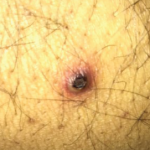NEW YORK (Reuters Health)—Treating inflammatory bowel disease (IBD) with tumor necrosis factor (TNF) inhibitors is associated with a doubling of the risk of central nervous system demyelinating disease, researchers from Denmark report.
“Based on the current evidence anti-TNF should be used cautiously in patients with an own or family history of demyelinating disease,” Dr. Nynne Nyboe Andersen from Statens Serum Institut in Copenhagen told Reuters Health by email.
“Patients treated with anti-TNF should be closely monitored for demyelinating disease with neurological examinations and if a patient develops signs of demyelinating during ongoing treatment, therapy should be discontinued promptly,” Dr. Andersen said.
“Previous case reports, retrospective cohort studies, and data from spontaneous surveillance reporting systems have identified patients treated with anti-TNF developing a demyelinating event, such as multiple sclerosis and optic neuritis,” Dr. Andersen noted. “It remains uncertain, however, whether these demyelinating events reflect a coincidental event or whether they are causally associated with anti-TNF.”
Dr. Andersen and colleagues used data from the Danish Civil Registration System to compare rates of central demyelinating diseases among 4,504 patients with IBD exposed to anti-TNF and more than 16,400 matched IBD patients without exposure to the drugs.
Exposed patients experienced 11 central demyelinating events, for a rate of 7.5 events per 10,000 person-years. By comparison, unexposed patients experienced 17 central demyelinating events, for a rate of 3.3 events per 10,000 person years.
The risk of central demyelinating disease was significantly higher among exposed than among unexposed IBD patients (hazard ratio, 2.19). But the absolute risk difference was only 3.9 events per 10,000 person years, the researchers report in JAMA Internal Medicine, online Oct. 5.
Running the analysis 10,000 times with a new random selection of controls in each analysis resulted in a median 1.95-fold risk increase among those exposed to anti-TNF agents.
“Despite bringing novel data on the relative risk of demyelinating diseases associated with TNF- inhibitors, our study findings need confirmation in even larger scale studies with increased methodological robustness and precision before any changes in therapeutic management should be made,” Dr. Andersen concluded.

